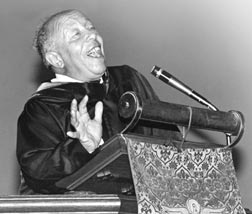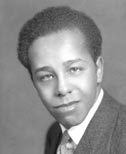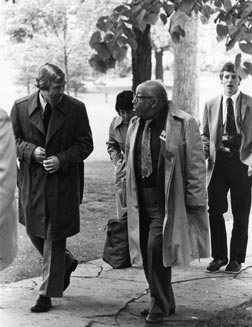Glimpse of a Visionary: Jeffrey Campbell ’33
By Steve Peraza ’06
 Jeffrey Campbell ’33 is generally thought of as St. Lawrence’s
first African-American graduate. In a University
Fellowship paper, Steve
Peraza ’06, a history and sociology double major from New York City,
contends that Campbell deserves to be recognized on different and broader
grounds. “Much of the attention brought to Jeffrey Campbell’s
name at St. Lawrence University has centered on Campbell’s social
status as the first African American student to graduate,” Peraza
writes, “not his accomplishments as an exemplary American citizen
committed to his ‘faith and works’. Campbell may never have
accepted that legacy; he might have more readily identified
with a legacy that posits him as a progressive-minded and intellectually
motivated Unitarian Universalist minister.”
Jeffrey Campbell ’33 is generally thought of as St. Lawrence’s
first African-American graduate. In a University
Fellowship paper, Steve
Peraza ’06, a history and sociology double major from New York City,
contends that Campbell deserves to be recognized on different and broader
grounds. “Much of the attention brought to Jeffrey Campbell’s
name at St. Lawrence University has centered on Campbell’s social
status as the first African American student to graduate,” Peraza
writes, “not his accomplishments as an exemplary American citizen
committed to his ‘faith and works’. Campbell may never have
accepted that legacy; he might have more readily identified
with a legacy that posits him as a progressive-minded and intellectually
motivated Unitarian Universalist minister.”
The son of a blue-eyed, blond-haired white woman and a Black Boston attorney,
Campbell admits in a brief autobiographical sketch that he bore the psychological
and social “burden” of mixed racial lineage from his birth
on March 1, 1910 (he died September 16, 1984). Perhaps those moments in
which the Campbell family had to guard their safety because of racial discrimination
led Campbell to ignore his “racial condition” and “establish
[his] individuality” as a human being and not a Black human being.
More “Useful” Values
Campbell does not see himself as identifying with “blackness”’ first
and foremost, but rather attaches himself to more “useful” values.
Throughout his writings, both as a youth and as an adult, Campbell
consistently positions himself as valuing education, personal integrity,
intellectual freedom and tradition.
Paramount
among all of Campbell’s values and beliefs, all of his personal convictions
and the occupations he chose to fulfill them, was the mixture between faith
and works, i.e. between theory and practice. Campbell’s conceptualization
of faith, combined with his whole-hearted commitment to it, not only conditioned
the way he would think and behave in his life, but also placed him as a perennial
critic of the status quo, the “bourgeoisie” and capitalism.
 Jeffrey Campbell’s Ideal University
Jeffrey Campbell’s Ideal University
Nowhere are Campbell’s criticisms of society more cogent than in
his analyses of the collegiate experience of St. Lawrence University
both as an alma mater and as a privately-owned business. No essay discusses
the negative effects of the outside world on St. Lawrence University,
as well as the University’s inability to live up to its founding
principles and ideals, as does “How I Would Achieve My Ideal University,” published
in The Laurentian in 1932. Campbell does not directly condemn
St. Lawrence University, but he does condemn the University’s inability
to facilitate an education fides et veritas, “in faith and
in truth.” As he would say later in his autobiographical sketch: “I
found [St. Lawrence] without a philosophy for tackling entrenched
prejudice.”
The University’s social limitations, for Campbell,
were directly tied to its connections to the outside world. He felt that
the University’s
officials and students limited their intellectual growth in
order to perpetuate the institution’s prestige and wealth.
 Why He Wrote
Why He Wrote
Campbell wrote to achieve his humanity, and to challenge his
readers to do the same. To achieve humanity for Campbell
meant to recognize the individual peculiarities and complexities of all
human beings and to accept them as part of God’s creation and the
grace it promises to all of its subjects. It is in the latter sense,
alone, that Campbell identifies himself within the struggle
for racial equality in America.
Campbell does not, however, identify
himself as a black man fighting for racial equality. He entered
the national debates about race, not to end the brutal racial
discrimination and disenfranchisement of blacks in America, but rather
to delineate how racism in America tarnishes the humanity that joins all
people.
Campbell should not be seen as a Civil Rights pioneer because his
message did not address race per se. Instead, his message focused
on his religiously influenced vision of God’s creation as one of brotherhood.
This, and not social and racial equality, was Campbell’s goal in
discussing the social limitations posed by a racialized society.
In light of Campbell’s goals as an intellectual and writer, the legacy
that St. Lawrence University ascribes to Campbell should underscore his
qualities as a visionary thinker, for evidence suggests that Campbell,
himself, might not have supported institutional attempts to inscribe him
as the grandfather of diversity.

